Things You Should Never Say to Your Child
This post may contains affiliate links which means we may receive a commission on products or services that you purchase through clicking on links within this blog.
An offhanded comment in a heated moment can do more damage than you think. It can cause emotional repercussions for children later on in life.
It’s easy to say something that gives them the wrong message, and you probably don’t even realise it.
Words matter. Especially those we say to children. And it’s easy to think your child is too young to understand or remember. They are never too young to be affected by it.
And young kids believe everything their parents say. They believe the negative things that are said and it stays with them as they grow. It becomes their belief system and how they feel about themselves. It can lead to unhealthy relationships, low self-esteem, anxiety and they can have trouble dealing with their emotions for their entire lives,
But we can take more notice of the things that we say.
The things you should never say to your child
“Stop crying”
Telling a child to stop crying obviously doesn’t work. It doesn’t just make them feel bad for what made them start crying in the first place, but also for their reaction to it. It can make them feel like they aren’t allowed to express their emotions. That there is something wrong with how they feel.
It’s important for kids to express their emotions, and not to keep them bottled up. It is better to help them to recognise their feelings and deal with them.
“Calm Down”
If you were upset and someone told you to calm down, would you? Probably not. It’s no different to kids. They are having an emotional outburst and being told to calm down is likely to make them worse.
“You don’t mean that”
As adults we go through a whole range of emotions, but when it comes to kids, it’s easy to forget the emotions they go through too. And it can be hard for them to understand their emotions and know how to deal with them. When we tell them that they don’t feel that way, we are invalidating their feelings and basically saying to them that what they are feeling doesn’t matter. They can become disconnected to their feelings because they are being told they are wrong. You should never tell a child that what they are feeling is bad, wrong or not okay.
“You’re a bad girl / bad boy”
Calling a child a bad boy or a bad girl makes them feel like there is something wrong with them or who they are. It is better to express your concerns about their behaviour. There is a difference between saying, “you are bad”, and “you did a bad thing”. It should be about their behaviour, not them as a person.
“Toughen up”
It can be hard for kids to hear this, because they start to feel like there is something wrong with them. It damages their self esteem when they really need a boost.
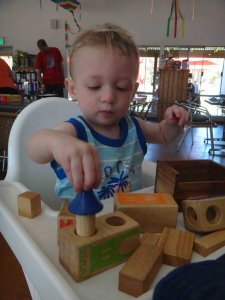
“Everything will be okay”
If a child is seriously worried about something happening in their life or something they’ve heard about, telling them that everything will be okay isn’t going to help settle their fears or worries. It doesn’t set their mind at ease. It is better to try and address their concerns, age appropriately, and explain that you will do everything you can to keep them safe.
“That upsets me”, or “I’m mad at you”
It puts an unfair burden on a child to think that they are responsible for their parents feelings and thinking they are making you sad or angry can make them feel worse. Try and talk about how the behaviour affects everyone and how you both can work on it.
“Don’t act like a baby”
It can be hard for kids to control their emotions. And telling them they are acting like a baby may make them feel like their emotions aren’t normal. Comparing them to a baby feels degrading for a child and they could start doubting their abilities.
“Why can’t you be more like your sibling?”
Comparing a child to a sibling can make them feel like nothing they do is good enough, and they don’t want to try any more. Sibling rivalry happens with most siblings at some point, but saying this can also cause added resentment.
“You’re overreacting”
Their behaviour might seem like an overreaction to you, but they have a different perspective. Try getting them to talk through what they are feeling and finding out why it’s a huge deal to them. They might be going something you hadn’t thought of and it helps to have a better idea of where they are coming from.
“You’re okay”
It can be an automatic response when a child hurts themselves, but it can make them feel like they aren’t allowed to be upset, or that them being hurt is okay and how they feel doesn’t matter.
“Your things are mine”
While you probably paid for most of their things, telling a child that their things are yours, and they don’t really own any of it can be hard for them to hear. It can make them feel insecure to think you, or someone else can take their stuff away just because you feel like it.
“That’s not good enough”
Telling a child that what they are doing isn’t good enough won’t help them get motivated to try harder, but it might make them want to stop trying altogether, especially when they’ve tried their best and it’s still not good enough.
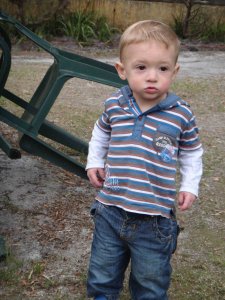
“You’re ungrateful”
Often kids don’t understand what it takes to provide things for them and how much better off they are than others. But telling them they’re ungrateful doesn’t help. It makes them feel bad but they don’t know what to do about it. You can explain to them why gratitude is important and maybe look at getting them to help people who are less fortunate.
“You can do better”
Kids can try their hardest, but it still might not meet your expectations, especially if you compare their abilities to what other kids can do.
“You’re doing that wrong”
It can be hard as a parent to see your child doing something “wrong” and stepping in with a solution or doing it for them. It makes them question if they are capable of doing something and are less likely to try next time. They need to learn to do things for themselves and find out what works and what doesn’t. They will get more of a boost when they figure it out on their own.
“Because I said so”
This is definitely something a lot of us have probably heard from time to time. It might be easier, but it doesn’t really offer a child much to go on. And it can make them feel more frustrated because they still don’t know why. Try and explain why you have that rule, or why they can’t do or have something they want.
“I wish you were never born”
This is probably the most hurtful thing a parent can say to their child. To think that their own parent wishes that they didn’t exist has to be absolutely heartbreaking. And that could do some damage that can never be undone. Even if said in the heat of the moment and wasn’t really meant, that could scar your child for life and will always be in the back of their mind that you wished they weren’t here.
Many of us can say things in the heat of the moment that we wish later on we didn’t.
If we can try to be aware the effects of what we say has on others, especially our children, it can make a huge difference to their well-being and mental health as they grow.
Because words are more powerful than you think. The things you say can affect someone for the rest of their life. Choose your words carefully.
It’s definitely something I have been trying to be more mindful of.
I’m not perfect, but I can do better.
Kids shouldn’t grow up thinking that they’re useless or constantly feeling bad about themselves because of things said in the heat of the moment, out of frustration or whatever compelled someone to say it.
Nobody is a perfect parent. But by knowing things you should never say to your child, you can build a better relationship with them, and they can grow up to be more positive, confident and happy.
Have you said something to your child that you wish you hadn’t?
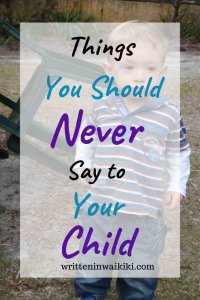
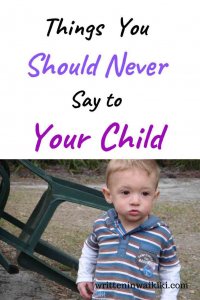
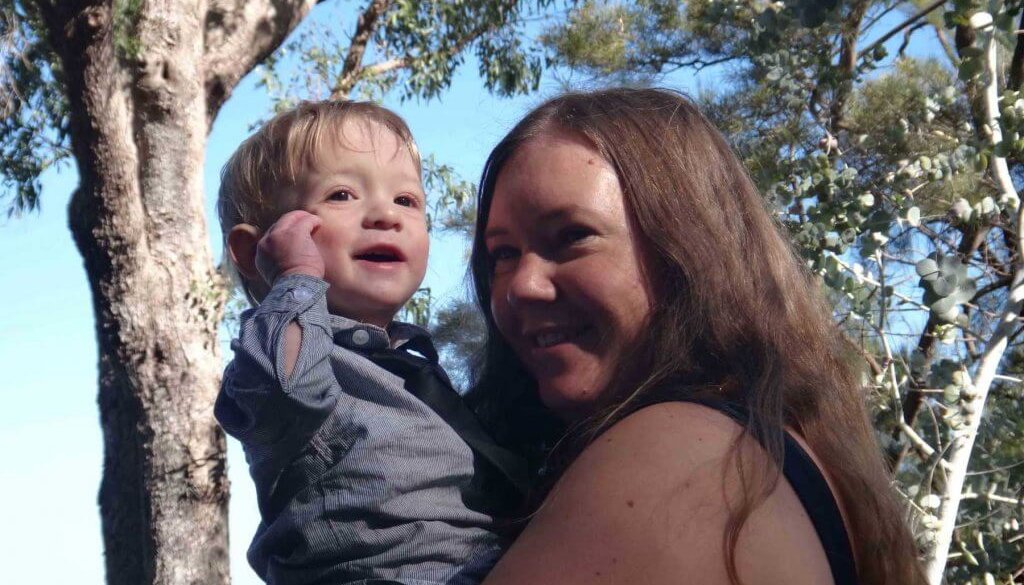
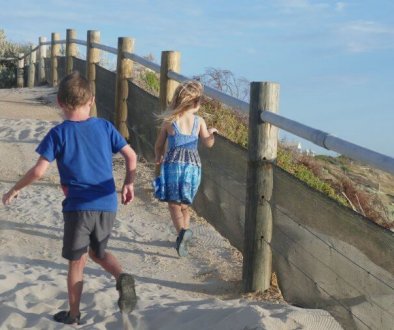
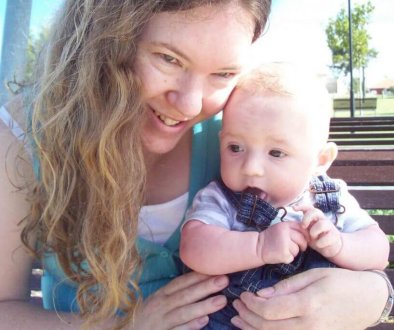
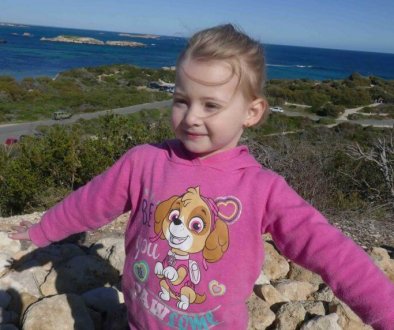
October 26, 2019 @ 3:05 am
It’s shocking that esp some of these are said to children daily. 🙁
October 27, 2019 @ 8:38 am
I love this! I am a big advocate of respectful parenting, and this list is spot-on. Thanks for sharing!
October 27, 2019 @ 11:10 pm
Great article, all these sayings can be so harmful to a childs development and how the form relationships! I am a preschool teacher and we avoid saying these things in the classroom as well. Thanks for sharing.
Dora xx
October 30, 2019 @ 7:43 pm
Great article thanks so much for sharing
November 13, 2019 @ 8:42 pm
I am so grateful to you for this excellent reminder about how our children need to know that their feelings matter. We must validate feelings and allow our children to process them while they are young so that they can learn how to do so in an appropriate way under our guidance and support. Love this! Thank you for being an advocate for our kids! Yay!